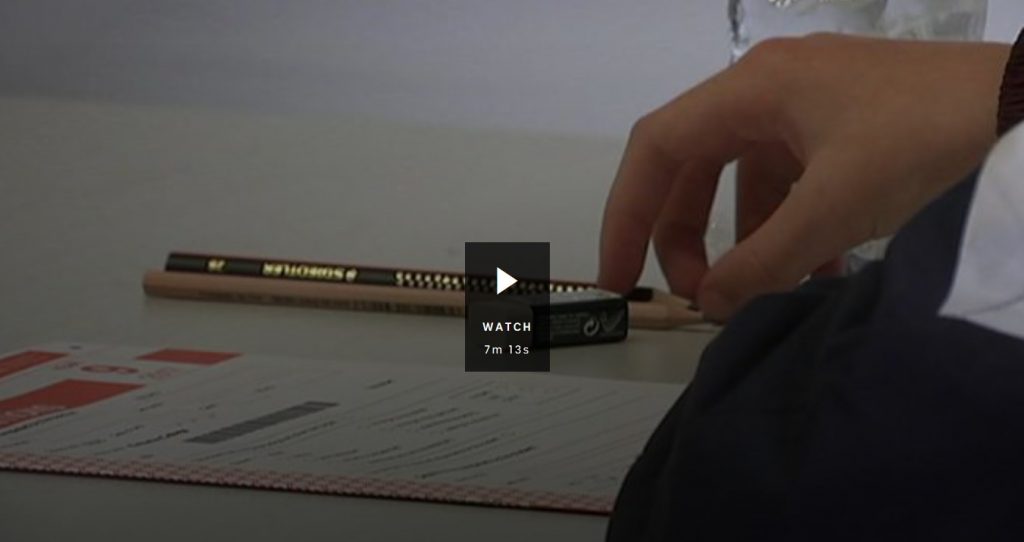
Why the MySchool website should go
Click the above image to view the ABC 7:30 report on NAPLAN and the My School website featuring St Paul’s School
St Paul’s School has great teachers. A week or so ago, we received four awards at the National Education Awards (the most of any single school in Australia) recognising the work the teachers and staff are doing. One of those awards was for our professional development programs. My expectation as Headmaster is that all staff are continually growing (including me), getting better at what we do. After all, we are a learning organisation.
Part of our professional development program is the regular appraisal of the staff. Data for the feedback is gathered from a number of sources to create a broad picture of a teacher’s practice in the classroom: student feedback, colleague feedback, lesson observations, planning documentation, and a self-reflection. All this data provides a rich picture of how a teacher is growing.
Following the feedback, a teacher develops a professional learning plan and might be allocated a coach to support their further development.
Some may think this odd, but I choose not to look at that individual data and feedback. However, at the end of each year, I receive a summary of how everyone on the team is growing. This feedback gives me an opportunity to celebrate and encourage staff. The feedback is about promoting growth. For that feedback to be effective, it has to be given in a way that demonstrates a genuine desire to support a person to improve, rather than being a “stick”, or measure of a person’s performance. Intrinsic motivation is far more effective than extrinsic motivation.
Now imagine this for a moment. Imagine if a teacher’s performance was assessed on the results of a single test his class sits in May of each year.
Now imagine that those results were displayed on the wall of the administration building so parents and students could see whose class performed the best on that test. Imagine that these results were then published on the school’s website. There would be a flurry of requests from parents to have their child in Mr X’s class, or Mrs X’s class in 2019 because they were obviously the better teacher, and calls for me to terminate the employment of Mr Y.
How would Mr Y be feeling? How might he respond when he sees his name at the bottom of the list? What might he be compelled to do when next year’s test comes around? To save his job, he might begin his class’s preparation for the test a few weeks earlier. He might put aside the great unit he had designed to give his students a greater understanding of our political history to spend more time ensuring his students will do better on the test. He might withdraw his offer to run the next school play because he cannot afford to be distracted from the upcoming test. Maybe he will ask his weaker students to stay home on the day of the test, or “coach” them to get through the questions.
Regardless of what he might do, Mr Y will be feeling threatened, humiliated and under-valued. He will be feeling this way not because he isn’t a great teacher, but because the measure of his performance hasn’t highlighted what is really going on in his class. The data is out there for all to see, but is not able to defend himself. He cannot tell people that in his class there are three students with anxiety; five who come from dysfunctional homes and come to school without breakfast. He cannot publish on the school’s website information about the four new students who have come from refugee families and have recently commenced in his class. Not only are those students suffering from the effects of trauma, but they also cannot speak English.
As Mr Y laments the results of his class, he needs to make a choice. Does he continue to do what is right for the students he so deeply cares about? Does he give them the rich, well-rounded education they deserve so they have the skills, character traits, and understanding of knowledge to take their place in society; or does he save his job?
This is why the “My School” website must go. The “My School” website publishes data without context. It encourages parents to compare school against school, similar to comparing home loans. It completely undermines the integrity of the teaching profession and is aimed at short-term headlines and leader boards, rather than the good of the children of our nation.
St Paul’s recently featured on the ABC’s 7.30 program, where I make some fairly strong comments about “My School”, similar to my views expressed in this article. This is part of our vision of being leaders in educational thinking and practice – advocating for a better education system in Australia.
I do hope that our newly-appointed Federal Education Minister, Dan Tehan, takes this advice and removes the “My School” website. This would be a terrific first step as an Education Minister and a good way to show that he cares more about the school students of Australia than cheap headlines.
Dr Paul Browning
Headmaster

